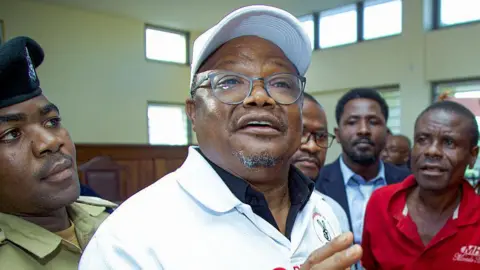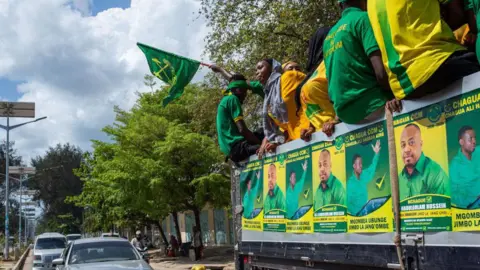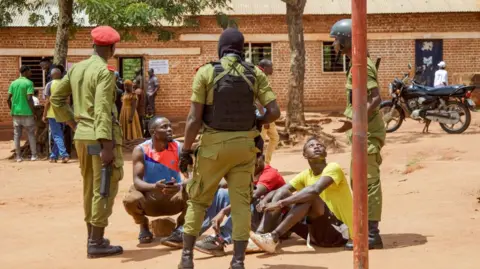ARTICLE AD BOX
Basillioh Rukanga & Alfred Lasteck
BBC News, Nairobi & Dar es Salaam

 AFP
AFP
Tundu Lissu faces treason charges
Shot 16 times in an assassination attempt in 2017, Tindu Lissu is the great survivor of Tanzanian politics - and one of its most persecuted politicians.
But some are asking whether he has now reached the the end of the line.
Lissu, the leader of the main opposition party, Chadema, is back in the limelight after being charged with treason - a crime for which the maximum sentence is the death penalty.
Still, he is undeterred. Despite the enormous risk, he believes he can pressure the government to institute reforms, ahead of presidential and parliamentary elections in October.
But can he weather the storm in a harsh political environment, and against what he believes are politically driven charges?
His party has been disqualified from the elections and he has been in detention for the past two weeks.
In September last year, Lissu told the BBC that nothing would come on a silver platter, and it would take courage to demand reforms "on the streets and in the villages".
To achieve his goals, he felt he had to take over Chadema's leadership.
A fiery politician, Lissu was critical of the way the party was being run, accusing then chairman Freeman Mbowe of being too reconciliatory towards the government.
In an intense race, he ousted Mbowe from the post.
After just three months at the helm of Chadema, Lissu was this month arrested and detained for a speech allegedly calling for the public to launch a rebellion and disrupt the elections.
He was not allowed to enter a plea on the treason charge but pleaded not guilty to a separate charge of publishing false information.
Prior to his arrest, he had been holding gatherings across the country with a rallying call of "no reforms, no elections".
He said the current system was rigged in favour of the ruling CCM party, adding that without reforms, there was no point in taking part in the elections.
He is due to reappear in court on Thursday. He cannot seek bail because he has been charged with treason.
His international lawyer, Robert Amsterdam, told the BBC that it was their "mission to defend democracy".
Yet it is no simple task - CCM has won every election since independence, and is unlikely to easily let go of its stranglehold on power.
There is also a rift in Chadema, with some members disagreeing with Lissu's strategy.

 AFP
AFP
The CCM party has won every election in Tanzania's history
The party is barred from contesting October's election after it refused to comply with the electoral commission's requirement to sign a code of conduct.
The document's key objective "is to ensure that political parties and their supporters behave well... and maintain peace and harmony" during the elections.
Chadema sees the code of conduct as a ploy to contain the opposition, and it fears that state repression will continue.
In September a senior Chadema party official was abducted and brutally killed amid a wave of abductions of government critics.
During local elections in November, Chadema said thousands of its candidates were barred from participating. The ruling party won about 98% of the seats.
The government dismissed suggestions that the elections were not free and fair, saying they were held in accordance with the rules.
But for Lissu, the local elections justified his calls for reforms ahead of the presidential and parliamentary polls.
- Tanzania's main opposition party banned from election
- Why Samia's hesitant reforms are fuelling Tanzanian political anger
Campaign group Human Rights Watch has expressed similar fears, and has urged the government to end political repression.
The Catholic Church has added its voice to calls for the unconditional release of Lissu, and for fair elections.
But the arrest of opposition politicians has continued, despite Prime Minister Kassim Majaliwa promising earlier this month that the authorities would ensure security and fairness in the polls.
The BBC has reached out to the government for comment.
President Samia Suluhu Hassan gave Tanzanians greater political freedom after she took office following the death in office of her predecessor John Magufuli in 2021.
However, Tanzania was once again "beginning to see the wave of repression and state-orchestrated violence" that characterised Magufuli's rule, Tanzanian political analyst Nicodemus Minde said.
It was during that era that Lissu survived an assassination attempt.

 AFP
AFP
The government has been accused of repression against the opposition
Before his arrest, Lissu said his party had a list of "minimum but critical reforms that must be made to guarantee free elections".
Mr Amsterdam, his lawyer, told the BBC that this included the formation of "a truly independent national electoral commission with members unconnected to the government" - and this must be enshrined in the constitution.
Chadema is also demanding that when there are electoral disputes, the burden of proof should lie with the commission to show that the vote was free and fair.
Lissu's strategy has come at a heavy cost to himself and Chadema, as a faction within the party, known as G-55, has adopted a softer stance.
It has called for the party to contest the elections while pursuing talks with the government over its demands.
That is the approach taken by the second largest opposition party, ACT-Wazalendo.
Along with 16 fringe opposition parties, it has signed the code of conduct. Only Chadema has refused.
Lissu appears to see neighbouring Kenya - where mass protests last year forced the government to drop plans to increase taxes - as a model to follow.
At the time, he told the BBC that Tanzanians had not "pressed hard enough for democratic reform", and what Kenya went through in order to get [its] democratic dispensation is something that we need to do".
Whether such a strategy would work is unclear, as many Tanzanians appear reluctant to publicly support a campaign that could rattle the government.
But Mr Amsterdam said the more intransigent the government, the more it would spur Chadema's supporters "to push forward and engage in civil disobedience".
He added that Chadema would use "every legal and political tool" to achieve change.
But political analyst Thomas Kibwana criticised Lissu's strategy, saying that with the term of the current parliament due to end in June there would not be enough time to give legal effect to any major reforms ahead of the October election.
He said it might be better for Chadema to wait until after the election.
Fulgence Massawe, the director of a legal rights organisation in Tanzania, told the BBC that Chadema's push for electoral reforms faced significant hurdles, but the party had the right to go to court to challenge its exclusion from the elections.
Mr Minde said that if Chadema remained shut out of the elections, the ruling party is likely to increase its already overwhelming majority in parliament.
The analyst added that Chadema might even lose its standing as the main opposition party, and "of course nature pulls back and probably other opposition parties will seize this opportunity".
It is a risk that Lissu and the party have chosen to take.
You may also be interested in:

 Getty Images/BBC
Getty Images/BBC

 3 months ago
97
3 months ago
97








 English (US) ·
English (US) ·